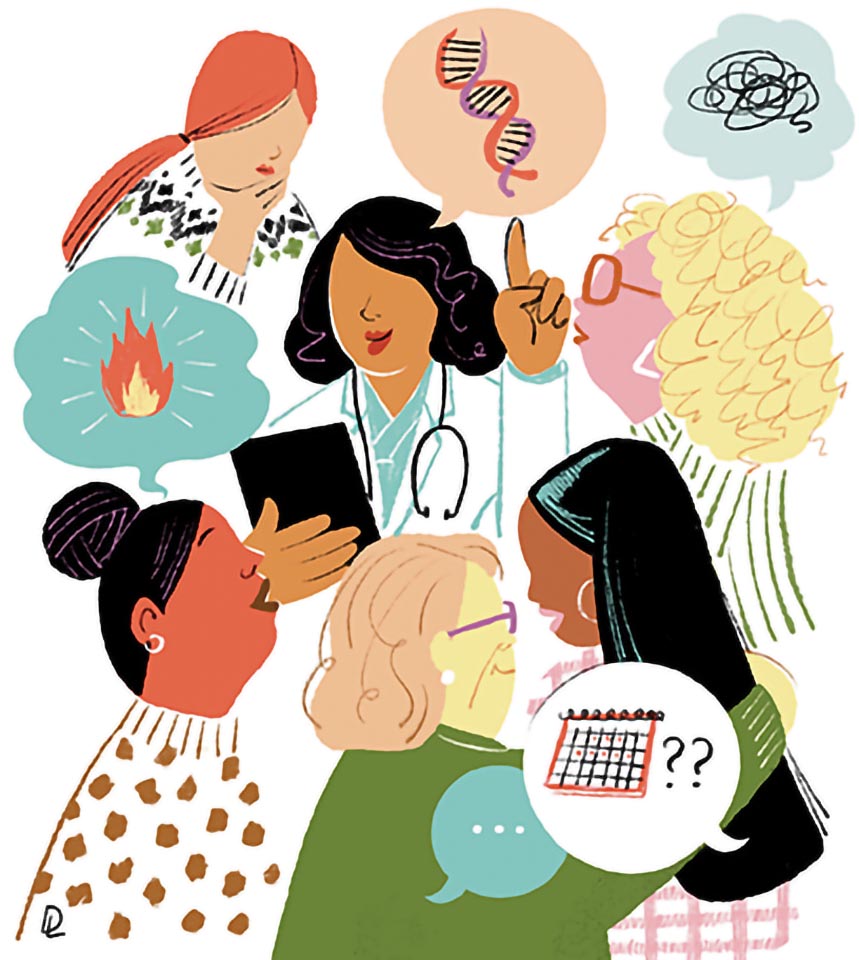Anna Barbieri ’95 was a busy obstetrician in her early 40s, “delivering babies night after night,” she says, when she started to experience emotional changes. “I thought that it was just the stress of everything getting to me,” Barbieri says.

In fact, it was perimenopause. This stage of transition into menopause typically lasts five years but can be as long as a decade, and can bring a range of symptoms including sleep problems, sexual changes, irregular periods, and brain fog, as well as the hot flashes and night sweats people are most familiar with.
Women going through this phase may not recognize it, and their doctors may not either. “I myself did not realize what it was for a good six to 12 months,” Barbieri says.
The experience inspired her to shift the focus of her practice. In her office on Manhattan’s Upper East Side, she now focuses on patients in midlife who are navigating menopause and other hormonal transitions.
Barbieri is board certified in obstetrics and gynecology as well as integrative medicine, the latter of which she describes as “things that should be part of medicine and somehow are not paid much attention to.” For example, along with conversations about hormone therapy and medications that can help symptoms, she talks to her patients about nutrition, stress reduction, and getting better sleep.
Barbieri has always been fascinated by the intersection between physical and emotional health. “To me they’re inextricably linked,” she says. “I think menopause is a perfect example of how these two go together.” Hormones, which go haywire in the lead-up to menopause, affect a person’s mental and emotional health, which in turn affect how a person perceives their physical experience, Barbieri says.
To avoid being caught by surprise like she was, Barbieri recommends that younger women educate themselves on what perimenopause looks like. And it’s a good idea for women to ask their mothers or other older female relatives about their own experience, she says, because menopause has a genetic component.
She also suggests trying to let go of the fear of this transition.
“We don’t need to feel compelled to fight against it,” Barbieri says. “Getting old and aging has all these negative connotations. The reality is menopause happens to all of us eventually, and that aging is a fact of life.”
Even though menopause happens to everyone who menstruates and lives long enough, people experience it differently, Barbieri says, and accepting menopause doesn’t have to mean suffering through it. She wants patients to be able to advocate for themselves in medical settings, so they can get effective care and not have their experiences dismissed.
That desire motivated her to become the founding physician of a digital health start-up called Elektra. It’s a platform that provides education and community to women going through menopause. Elektra’s website says, “We’re creating a movement to reimagine menopause as the beginning of a new chapter, one that is powerful and transformative.”
“We go through this process of transition and almost becoming the next version of ourselves,” Barbieri says. Just as she shifted her own professional focus in midlife and became a doctor who focuses on menopause, Barbieri has seen her own patients experience transformations in their professional lives, interests, and sense of purpose alongside their biological transformations.
“This time is a perfect opportunity for us to really learn how our bodies work, understand what’s happening, and use that knowledge to figure out how we can optimize our health for now, ourselves, and for the future.”
